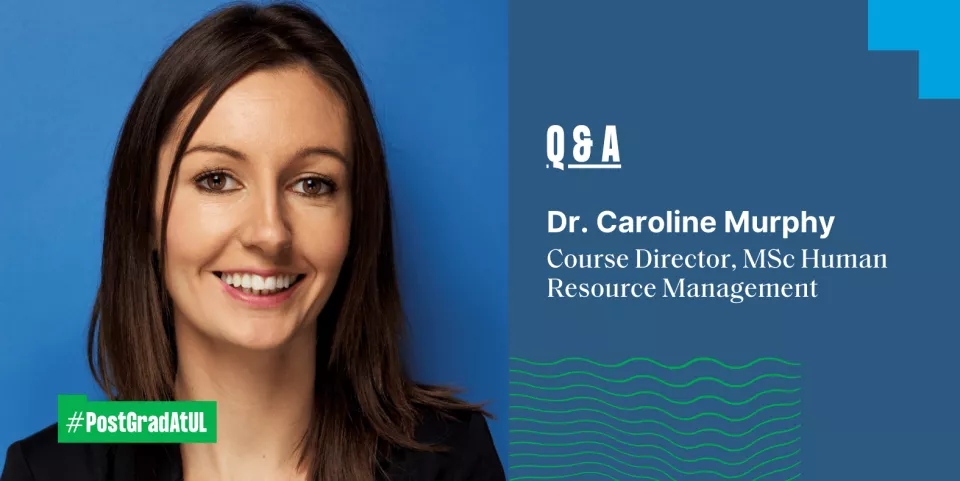

Dr. Caroline Murphy is Associate Professor of Employment Relations and Chair of Equality, Diversity and Inclusion at the Kemmy Business School. She lectures in Employment Relations, Human Resource Analytics, and Human Resource Management. She is a member of the management committee of the COST action Platform Work Inclusion Living Lab, and Associate Research Fellow at the Digital Futures at Work Research Centre (DIGIT, UK). Her work has received funding from the European Commission, Irish Human Rights and Equality Authority, Workplace Relations Commission, and Department of Jobs, Enterprise and Innovation. She leads the annual HR Practices in Ireland Survey for the Chartered Institute of Personnel Development.
What inspired you to pursue a career in Human Resource Management, and how has your own background shaped your role as Course Director?
My interest in understanding labour market and workplace dynamics develop led me to researching job quality, labour market equality, formal and informal care work, and employee representation. As a researcher I’m motivated by a desire to influence regulation and policies that contribute to fairer and more equitable workplaces. The opportunity to instill the importance of fairness, equality and a sustainable approach to workforce management in the next generation of professionals in the field HRM is incredibly fulfilling.
Can you share something interesting about your research?
As a researcher in employment relations, I find the intersection of work, care, and technology particularly fascinating. Increasing demand for care provision across developed economies, coupled with digitalisation is reshaping how employees balance work and care commitments, and the expectations they have in relation to employment flexibility.
What sets this programme apart from similar courses at other universities?
The Master’s in Human Resource Management at University of Limerick is distinguished by its strategic focus on sustainable work and leadership, exposing our students to diverse perspectives on the role of business and management in society. The program is designed to develop informed and imaginative leaders who are conscious of the importance of responsible and sustainable business practices. Our experienced teaching team equips participants with the skills to manage complex organisational issues, emphasising long-term employee and organisational development.
Are there any unique features or modules within the programme that students should be excited about?
The programme emphasises the development of professional competencies and includes modules tailored towards developing career success giving participants a competitive edge in the job market. Additionally, for those interested the program offers an option of dual degree opportunities with prestigious European business schools, providing international experience.
Are there opportunities for students to engage in research, group projects, interdisciplinary work, or practical experience such as internships during the course?
Yes, students undertake a research dissertation on a topic which they identify and are interested in working with the support of an academic supervisor
What skills or knowledge will students gain that are highly valued in the industry or field?
The broad range of assignments also allows students to apply their problem-solving skills and engage in the design of interventions to promote better working lives. By engaging with the challenges posed by a changing world of work, students will develop into responsible practitioners capable of executing ethical and sustainable decision-making in their future roles.
What type of candidates are you looking for, and what attributes or experiences make a successful student in this programme?
We are looking for a candidate interested in a career in HR, organizational development, management, or consulting. The course is available to both fulltime or part-time students (on site one day per week for two years). Applicants will possess a minimum 2:2 honours primary degree (in a relevant discipline (for example business/commerce). However, applicants with cognate backgrounds (where they must have studied at least some of the following subjects in their undergraduate degrees – management, organisational behaviour, employment relations, industrial relations, employment law, social psychology, learning) will also be considered.
Interested in exploring the Masters in Human Resource Management?
